The dark side of Rving is an unavoidable need to eliminate your solid waste. While it’s undoubtedly more convenient to travel with your own toilet, all that waste has to go somewhere, and RV waste is not always so easy to dump.
Sometimes, burgeoning RVers can be so nervous about finding a proper way to dispose of RV waste that they spend the weekend holding it in.
Eventually, you’ll have to take a load off, and this guide will show you where to dump your RV waste and finding closest RV dump station locations for safe black and gray wastewater disposal.
Across the country, RVers head to RV dump stations to safely offload there grey and black waste tank. An RV dump station is an officially designated location for environmentally safe disposal of waste from RV’s. A hose system that connects your black water tank to the outside world ousts your waste and sends it into a communal septic tank.
A covenant of RVing is only to use these designated dump stations to dispose of human waste.
One rogue dumper won’t bring down the industry, but if every one of us decided to release our refuse willy-nilly, there’d be no sanitary roads left to wander down.
RV dump stations are wide-ranging options that have various amenities included, depending on where you go.
Today, you’ll learn where to dump your RV waste responsibly and how to make the best out of these shitty situations.
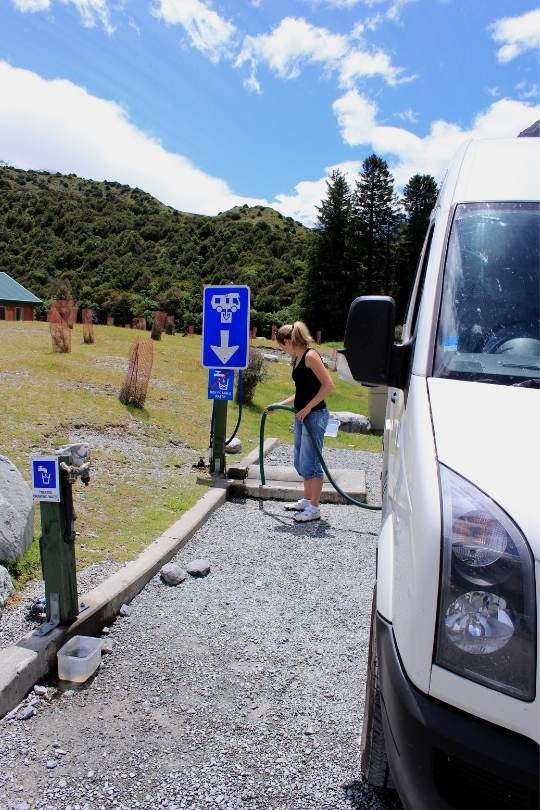
7 Places To Find A Dump Site To Dispose Of Your RV Waste Safely
Knowing where to dump RV waste can be a challenge, though RV dump stations are the fastest way to dump your waste tank, but there are some other places to look for these establishments are synonymous with sweet, sweet black water tank relief.
Most of these are already prominent stops on any RVers calendar, and all of these options won’t take you too far from a good time.
Here are 7 alternative places that will allow you to dispose of your RV grey and black tank waste safely:
1: RV Parks
Anyone capable of hosting RV communities will have a septic system in-house fit to dump RV waste.
Many RV parks and campgrounds have opened their dump stations up to the public for a fee. You don’t have to be staying at the RV park to use their facilities.
2: Gas Stations
While you won’t find a RV dump station at any gas station you stop by, if you head along the road for long enough, you’ll find a place to empty your waste tank.
Truck stops and travel centers are your best bets for finding a gas station with refuse release available.
While most gas stations with a dump station will charge you for it, combining your dump stop with a fill-up will save time and money.
Most stations won’t charge you for using the dump station if you buy some gas as well.
Once you find a gas station that provides a good dump and fill up deal, you can head to other gas stations in the same chain throughout your trip to consistently dump and save.
3: RV Dealerships
RV dealerships will often have vehicles for rent as well as purchase. Any place that offers a rental service will house a septic tank to ensure each vehicle is in pristine condition before its next journey.
If you are in a rental RV, you can confidently head to a dealership owned by the company that rented you the RV for a free RV dump station.
If you own your RV, most friendly store managers won’t mind you using their services.
4: Wastewater Treatment Plants
Your waste will wind up at a wastewater treatment plant anyways, so you may be able to cut out the middleman and dump your RV waste straight at the source.
Most treatment plants will have a septic tank on site capable of connecting to your vehicle.
If you head to your nearest wastewater treatment center, make sure to communicate your intentions.
Some operators aren’t happy about RVers showing up uninvited and trying to sneak their waste past security.
5: Outdoor Stores
Some Bass Pro Shops and Cabela’s locations have recognized RVer’s value to their businesses and made it a convenient stop on your route.
In addition to allowing you to spend the night, some of these stores have provided septic services to help you feel at home.
6: National Parks
National Park services want you to dump your waste anywhere but the woods while you are on their premises and have gone out of their way to make it as easy as possible to leave no trace.
Most National parks will have a free RV waste dump station somewhere on-site, so sync up your next trip to natural wonders with a full black water tank and reset all your systems.
7: Dump Station At A Marina
Boats and RV’s have a few things in common. One of those things is owners of both vehicles are encouraged not to dump their waste wherever they please.
Marinas home to houseboats will have septic systems built-in, and a friendly chat with the attendant will have you on your way to empty.
If you’re stopped by a marina, chances are you’re near a water source. Time your dump just in time for lunch, and you can enjoy a picnic lunch at the water’s edge after you’ve finished up the dirty work.
How to Find your nearest RV Dump Station?
RV Dump stations always seem easy to find until you need them the most. That’s why it’s always encouraged to start looking to dump your leftovers before your tank is full.
There’s no shame in emptying an only half-full tank, and you’ll thank yourself when you don’t have to spend a day searching for a dump station.
If you’re having trouble finding anything to connect your septic hose to, these tips will help you find the closest RV dump station.
1: Look For the Logo
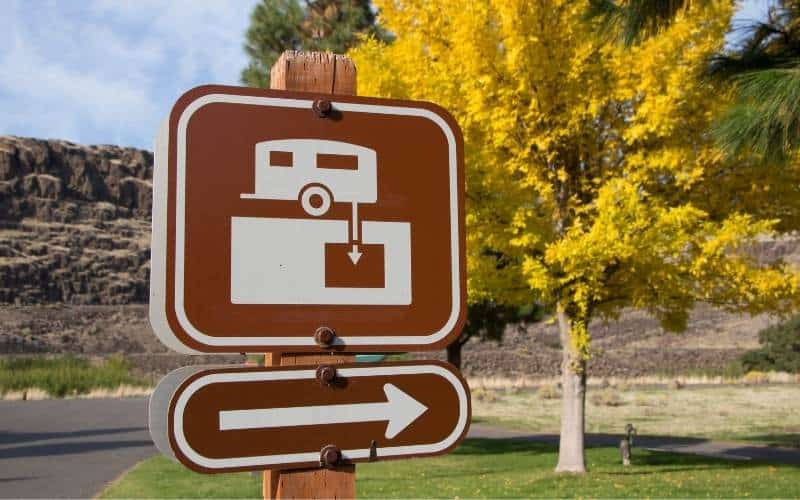
A universal sign identifies RV dump stations. If you see a campervan or a trailer with an arrow pointing from the RV to a hole in the ground, you’ll know if you follow that sign long enough, you’ll end up at an RV dump station.
Friendly highway exit signs, billboards, or old-fashioned road signs always exist in a dump station’s general vicinity.
2: Get the App
Every year there’s a new app on the marketplace designed to make life on the road easier.
Most camping applications will allow you to select a dump station filter to see an overview of the area’s options.
Ioverlander is a wonderful, user-built application for finding dump stations near your location.
Users constantly update the app for up-to-date information on local sanitation stations.
3: Plan Around Dump Stations
Don’t leave your next trip up to chance. When mapping out your route, take notice of available dump stations.
Find time in the schedule to take care of business so you won’t be left stressed later.
RV water tanks come in all shapes and sizes, but a good rule of thumb is to dump your water tank at least once a week while in use.
Knowing ahead of time where you’re going to get rid of your waste could end up saving the day.
Many dump stations have potable water fill-up locations, so you can plan to take care of two birds with one stop.
9 RV Dumping Station Tips You Should Know
It doesn’t take too many experiences to get the hang of the best techniques for finding and using RV dump stations.
One mistake will leave you covered in last week’s dinner, prompting RVer’s to develop rigid habits for visiting dump stations.
These tips and tricks have come from mistakes made over the course of many trips to the RV dump station.
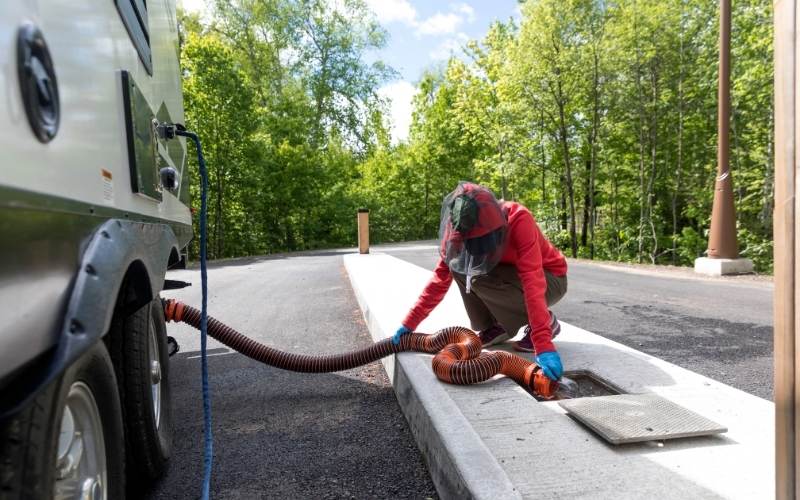
1: Don’t Wait Until Your Tank is Full
If your tank is completely full before you start looking for a dump station, the margin for error is remarkably low.
One closed business or incorrect listing could leave you staring down a full barrel.
Give yourself the freedom to make mistakes by starting the process well before you need it.
2: Keep It Level
Keeping your RV level is an underrated necessity on the road. When looking for a place to park, sleep, or dump, you’ll need to make sure everything is steady.
If you’re too far tilted forward, your fluids may run quicker than you were expecting.
If you’re too far tilted back, your tank may seem flushed clean, only for the meter to report a half-full bin the next day.
3: Invest in Dumping Equipment
Mistakes are bound to happen at the dump station. Keep a barrier between you and the poop by finding a pair of reusable plastic gloves.
Combining this with a spill-proof sanitation hose is an affordable way to stay dry.
4: Take Care of your Tools
When we finish emptying the tank, the first thing we want to do is wash our hands and drive off.
Establish Valuable care routines to protect the long-term health of your dumping equipment.
Be sure to wash your hose and the connecting nozzle thoroughly to shake loose any hanging pieces.
You’re better off doing this while the sewer hose is still connected to the septic system because no matter how careful you are, there are pieces left over.
5: Old Blackwater First
Most RVs have two separate holding tanks, one for the toilet (black water) and one for the sink (grey water).
Opening up the black water tank first will help you in the cleaning process, as you can use your grey water to wash out any leftover feces.
6: Check, then Double-Check
Before you climb back into the driver’s seat, check all parts of the process to make sure you aren’t leaving anything at the dump station.
First, look for all hoses and water fixtures to be put back in storage, and then make sure everything is secured and tied down.
The most important thing to double-check is the cap to your holding tank. Don’t drive off before you ensure the barrier between your waste and the outside world is secured.
7: Rules of the Trade
RV dump stations are a fantastic piece of the RV experience. Without these humble holding tanks, this lifestyle would be impossible.
Pay homage to RVing’s dirty side that makes the glorious aspects possible by following these simple rules.
8: Pay the Fee
Nobody in their right mind is going to sit in front of an RV dump station all day just to collect a few coins.
RVers often rely on each other’s kindness to live freely, and most dump station collections are nothing more than a sign and a lockbox.
Although it may be tempting to drive off scot towel-free, slipping in a few dollars when asked will help keep the stations open for everyone.
9: Clean Up After Yourself
Don’t force an hourly worker to hose down your excrements. Think of the people who are on the other side of these hoses and nozzles daily, constantly sorting through the muck. Make their days a bit easier by keeping a close eye on any accidental leaks and spills.
RV Dump Station FAQ’s
How often Should I empty my blackwater tank?
No matter how often you use your blackwater tank, you should be sure to flush out your system at least once every 5 days.
That will prevent any bacterial build-up that will lead to unsatisfactory smells or clogging down the line.
What is a RV Dump Station?
An RV dump station is a designated area to dispose of grey and black water RV holding tanks.
How do Dump Stations Work?
Dump stations are a combination of a septic system, water source and parking area for your RV.
Identify which side of your RV your septic tank pipe releases to, and park your RV so that the tube is directly across from the station.
You connect your septic nozzle to the station’s holding tank, typically a hole in the ground.
The station will include a water source to wash your tank out after you flush it, and some stations offer potable water to refill your tanks while you’re there.
Do RV Dump Stations Charge?
Just like there’s no such thing as a free lunch, there’s no such thing as a free dump. Most RV dump stations will ask for a fee for using their services.
However, you can often discount that fee by combining your trip to the dump station with another service, like getting gas or camping.
RVer often strategically takes care of their business to combine costs and save money.
Do I need to use a Dump Station?
Anyone with an RV grey or black water tank will need to employ the services of an RV dump station. If we all dumped our waste elsewhere, the industry would fall apart in one summer. Keep the roads clean by using a dump station.
Find Your Rhythm
Eventually, you’ll be so accustomed to heading to an RV waste station that finding them will be as easy as emptying them. Try out a variety of different tips and sites until you find what works best for you.
Once you get your dumping system down, don’t stir the pot. There are a few things in life worth experimenting with, but human waste is not one of them.
Taking time to learn the ins and outs of discovering where to dump RV waste will make one of the more unpleasant RV experiences take up less time and energy on the road

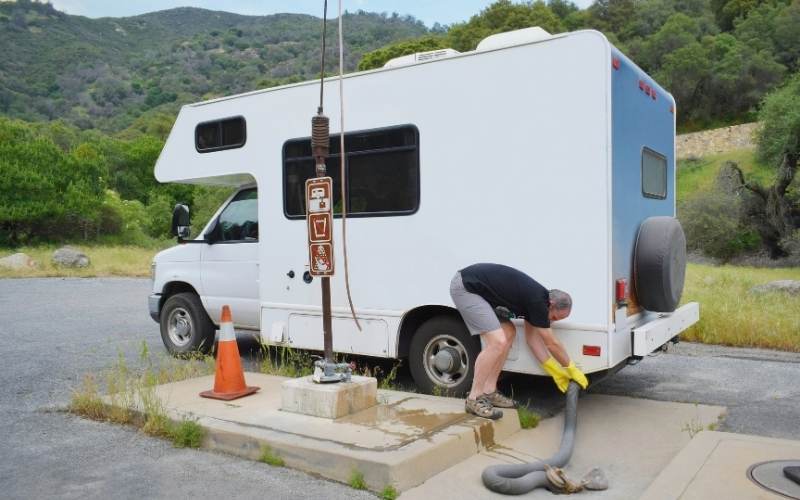

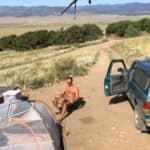
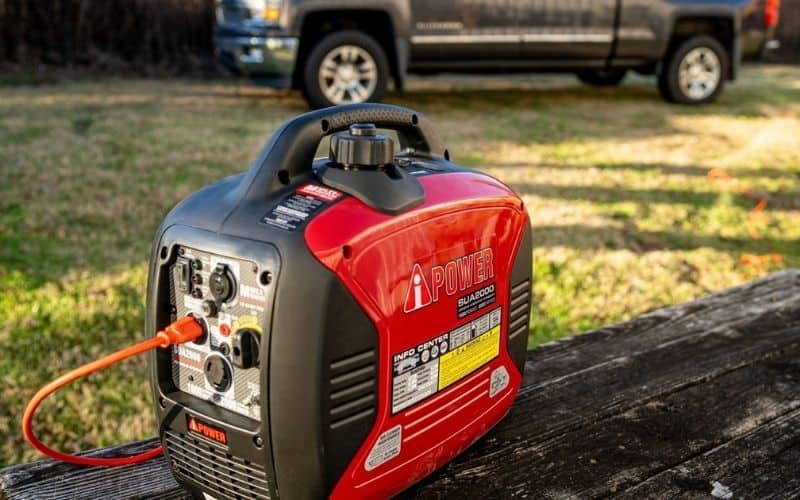
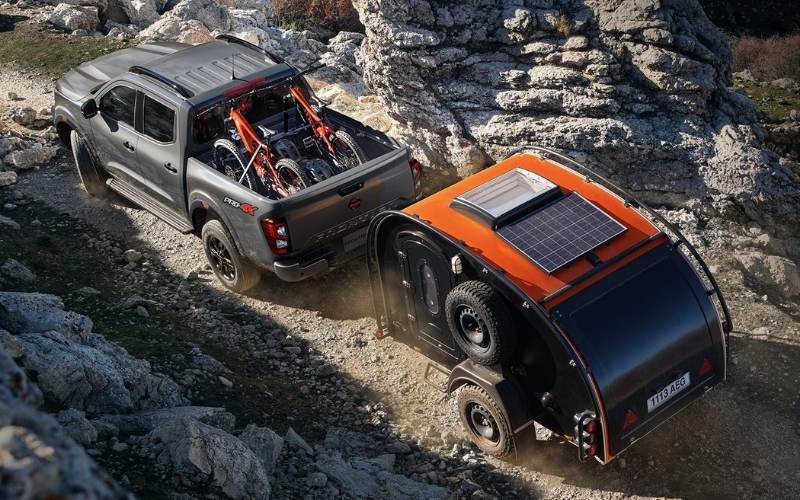
![6 Best DIY Teardrop Trailer Kits in [currentyear]: Top Rated Teardrop Camper Kits 9 The 6 Best Teardrop Trailer Kits](https://www.rvingknowhow.com/wp-content/uploads/2021/09/The-6-Best-Teardrop-Trailer-Kits.jpg)